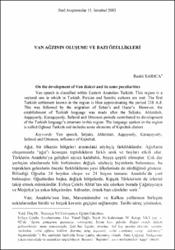| dc.contributor.author | Sarıca, Bedri | |
| dc.date.accessioned | 2014-03-07T12:30:23Z | |
| dc.date.available | 2014-03-07T12:30:23Z | |
| dc.date.issued | 2003-04 | |
| dc.identifier.citation | SARICA, Bedri. "Van Ağzının Oluşumu ve Bazı Özellikleri." İlmî Araştırmalar : Dil, Edebiyat, Tarih İncelemeleri, 15 (2003): 71-90. | en_US |
| dc.identifier.uri | http://dergi.fsm.edu.tr/index.php/iadeti/article/view/414/436 | |
| dc.identifier.uri | https://hdl.handle.net/11352/1364 | |
| dc.description.abstract | Van speech is classified within Eastern Anatolian Turkish. This region is a vectoral one in which in Turkish, Persian and Semitic cultures are met. The first Turkish settlement known in the region is Hun approximating the period 338 A.d. This was followed by the migration of Sabar's and Hazar's. However, the establishment of Turkish language was made after the Seljuks, Ahlatshah. Aqquyunly, Karaquyunly, Safavid and Ottoman periods contributed to development of the Turkish language's structure in this region. The language spoken in the region is called Oghouz Turkish and includes some elements of Kiptehak dialect. | en_US |
| dc.language.iso | eng | en_US |
| dc.publisher | Kitabevi | en_US |
| dc.rights | info:eu-repo/semantics/openAccess | en_US |
| dc.subject | Van Speech | en_US |
| dc.subject | Seljuks | en_US |
| dc.subject | Ahlatshah | en_US |
| dc.subject | Aqquyunly | en_US |
| dc.subject | Karaquyuuly | en_US |
| dc.subject | Safavid and Ottoman | en_US |
| dc.subject | Influence of Kiptchak | en_US |
| dc.title | Van Ağzının Oluşumu ve Bazı Özellikleri | en_US |
| dc.title.alternative | On the Development of Van Dialect and Its Some Peculiarities | en_US |
| dc.type | article | en_US |
| dc.relation.publicationcategory | [0-Belirlenecek] | en_US |



















